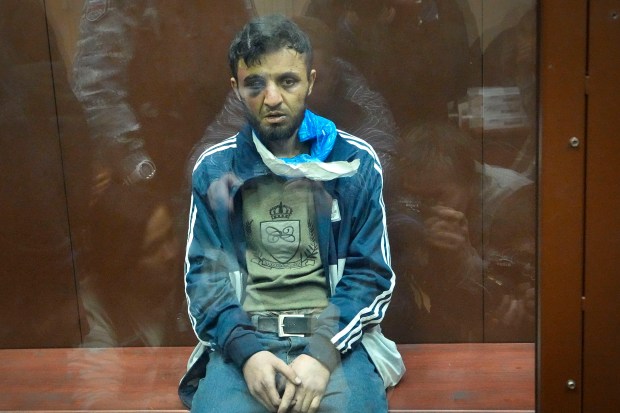The world has grown so desensitized to the offenses of Vladimir Putin’s Russia that the visible signs of torture on Islamic State terrorist suspects in court for the recent attack in Moscow sparked little reaction. After all, why be surprised?
The Russian government is no stranger to accusations of torturing people in custody, and it has violated international law in many other ways, both before and since its full-scale invasion of Ukraine in 2022. It has struck civilian targets with reckless abandon following an unprovoked invasion of a sovereign state. It has stolen more than 19,000 children from their Ukrainian families and relocated them against their will to Russia or Russian-occupied territory. It likely assassinated Putin’s biggest political opponent in prison recently.
The sheer number of offenses is staggering, but even so, Russia has previously sought to hide its crimes, deny them or defend them within the parameters of international law. Though it didn’t go as far as the George W. Bush administration with its legal gymnastics to justify torturing terrorist suspects, Russia’s prior actions gave a nod to a set of widely recognized international rules and norms.
That is the response of a bad actor that still believes accountability might apply, whether legally or in the court of public opinion. Intentionally distributing videos of agents of the Russian state committing violent acts of torture is not.
The behavior of the Russian government has worsened because Putin has no fear that he will suffer consequences. The general playbook of overwhelming his detractors with too many criminal acts is starting to gain ground internationally, while he succeeds in quashing opposition at home too.
More worrying, though, is that it isn’t just Russia. Impunity is contagious. Russia led the charge in assassinating opponents on foreign soil, but today, there are credible allegations against India, Saudi Arabia, Iran and Rwanda for lethal attacks against perceived adversaries overseas. These aren’t all pariah states. Three remain close partners of the United States and have incurred no real consequences for these offenses against human rights and national sovereignty.
When the United States has chosen to call out offenders of international law and norms, it’s been met with credible cries of hypocrisy and double standards. America does the international order no favors when it lambastes countries of the global south for not condemning Russia’s crimes while blocking meaningful action by the United Nations Security Council against Israel’s collective punishment of Gaza’s civilians.
If America is unwilling or unable to cajole its friends to abide by a set of international standards, what hope do we have of reining in the bad acts of others?
Call it the rules-based order, the liberal international order or a system of international law. It’s been with us in some form since the end of World War II, and, although deeply flawed, it has had notable successes. Greater predictability and engagement facilitated an explosion in global trade. Poverty rates around the world declined dramatically. Democracy spread for decades. It sought to prevent interstate wars, and it succeeded in diminishing them significantly, for a while.
This system was always applied on a curve. It was never powerful enough to rein in an unwilling superpower, but it did help shape state behavior and kept the bulk of it within certain parameters or risk the consequences. States that wholly bucked the system, such as North Korea, merely remained exiles, outside the constraints or benefits of the world order. Other states’ actions outside the norms could, and often did, garner a collective response.
As one example, as recently as 2012, even Russia and China voted in support of U.N. Security Council resolutions to condemn a military coup in Mali and authorize sanctions and a peacekeeping force. This used to be unremarkable, but unanimous actions like this simply don’t happen anymore. A rash of military coups across the Sahel in recent years couldn’t even muster a unanimous expression of concern.
A bit like Santa Claus, the system’s efficacy only ever extended as far as global belief in it did. During the Cold War, that global belief was grounded in the fragile cooperation of two competing superpowers. They allowed and fostered conflict where it suited them, but they still managed to prevent war between two nuclear powers.
Today, I’m not confident our existing system can do even that. Countries big and small across the globe no longer believe in it. The United States, once the system’s primary guarantor, appears no longer willing or able to play its part.
It can be easy to ignore the signs that our system of order is fraying, given how nebulous that order already was. But if that system continues to retreat, we will be left with only chaos — the kind that agents of chaos, such as Putin’s Russia, thrive on.
If the global community of states, such as it is, cannot manage to resuscitate the order we had, we ought to start looking hard for a better system to replace it.
Elizabeth Shackelford is the Magro Family Distinguished Visitor in International Affairs at Dartmouth College and a foreign affairs columnist for the Chicago Tribune. She was previously a U.S. diplomat and is the author of “The Dissent Channel: American Diplomacy in a Dishonest Age.”
Submit a letter to the editor, of no more than 400 words, by emailing letters@chicagotribune.com. To review our criteria, click here.



